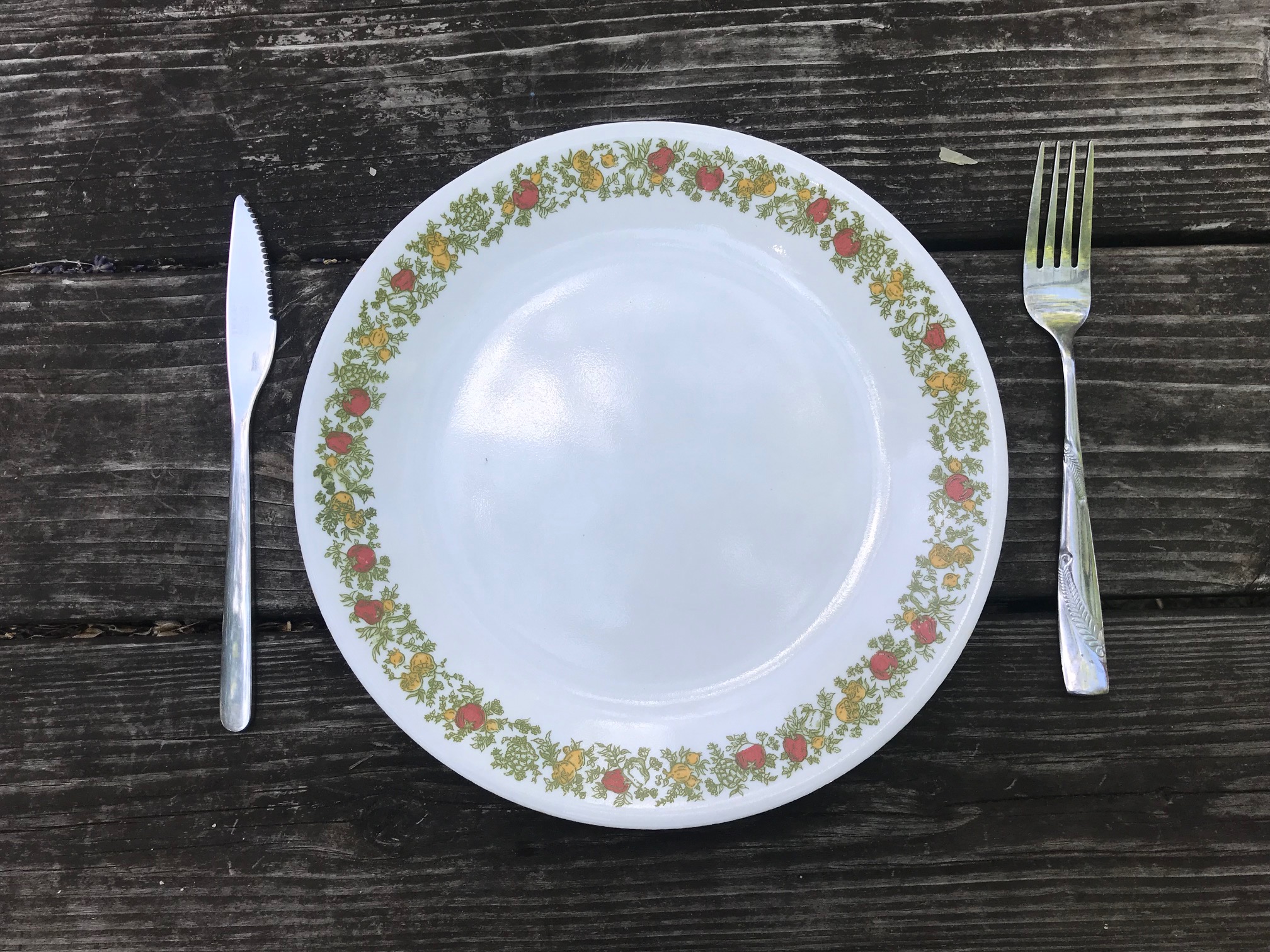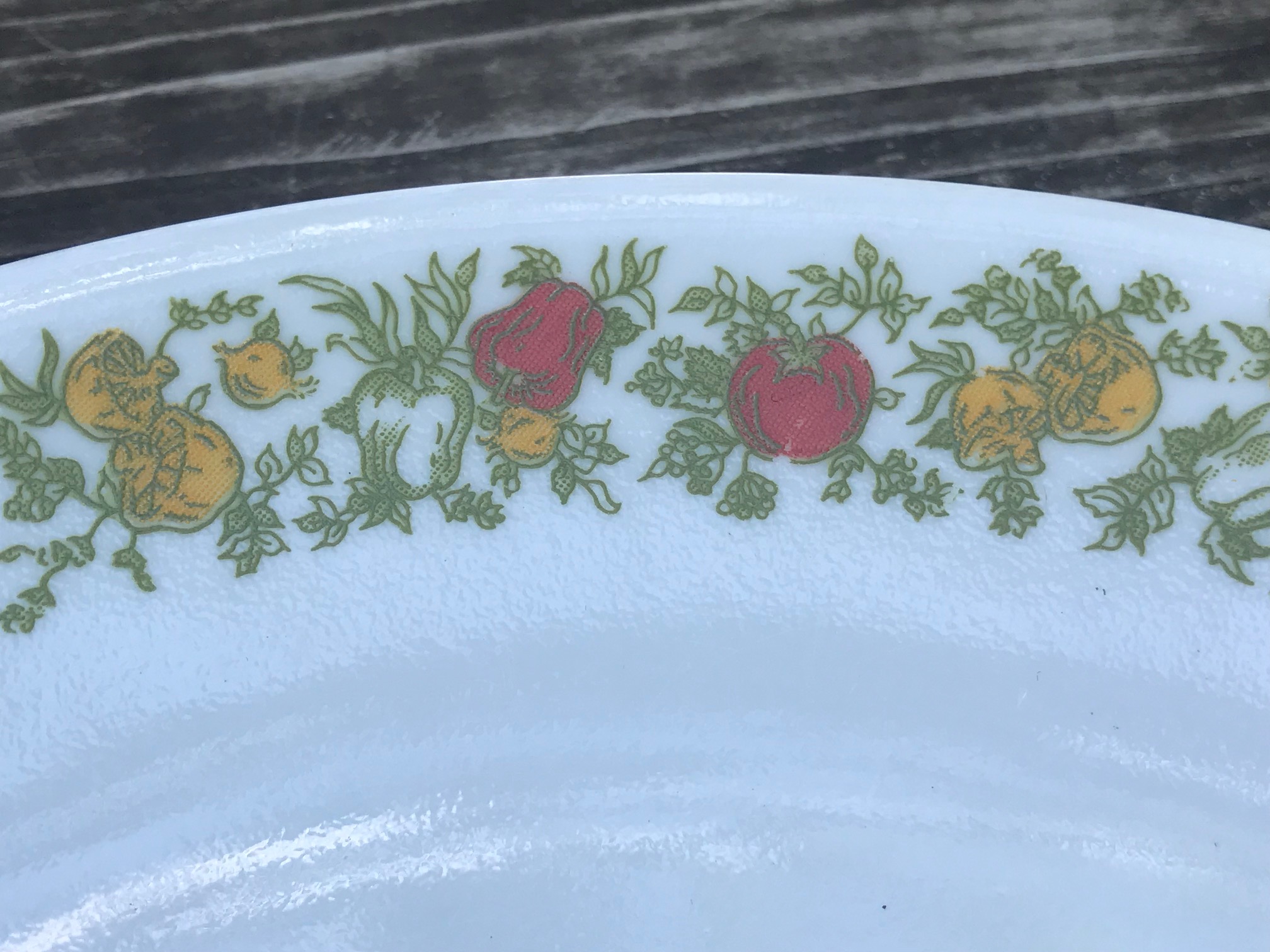Vintage Corelle Spice of Life Pattern Dish: 42,900 ppm Lead (90 is unsafe for kids) + 557 ppm Cadmium
Introduction:
Tamara Rubin is a multiple-federal-award-winning independent advocate for consumer goods safety and a documentary filmmaker. She is also a mother of Lead-poisoned children, her sons were acutely Lead-poisoned in 2005. Since 2009 Tamara has been using XRF testing (a scientific method used by the U.S. Consumer Product Safety Commission) to test consumer goods for toxicants (specifically heavy metals), including Lead, Cadmium, Mercury, Antimony, and Arsenic. All test results reported on this website are science-based, accurate, and replicable. Items are tested multiple times, to confirm the test results for each component tested. Tamara’s work was featured in Consumer Reports Magazine in February of 2023.
To see more Corelle pieces that Lead Safe Mama, LLC has tested, click HERE.
Vintage Corelle Dish With Spice-of-Life Pattern (year of manufacture unknown)
When tested with an XRF instrument, the painted decorative border on the food surface of this vintage Corelle plate was positive for a very high level of Lead. To see the full XRF readings for this exact plate, scroll down. Note: I don’t know the exact year of manufacture of this piece as it was purchased second-hand at GoodWill. If you have information about the year of manufacture (or year range) for this pattern, please comment on this article.
To learn more about XRF testing, click HERE.
As a mother of Lead-poisoned children and as an environmental activist, I have taken the stand that there is no place for any amount of Lead on our dining tables. None at all.
It literally just takes a microscopic amount of Lead to poison a child (or any human for that matter) and, as of the moment of publishing this article, there is NO individual, company, educational institution, or other agency studying the potential impact that eating off of Leaded vintage dishware has on the users (because no corporation stands to benefit financially from such a study). Consequently, as consumers we need to err on the side of prudence and proactively remove all potential sources of Lead exposure from our homes ourselves — starting with our kitchens.
For a pretty Lead-free & Cadmium-free option, click HERE.*
These particular dishes tested positive for 42,900 ppm Lead.
For context to better understand what this level of Lead means: the amount of XRF detectable Lead considered toxic in a newly manufactured item “intended for use by children” is anything 90 ppm Lead or higher in the paint, finish, or coating, and anything 100 ppm Lead or higher in the substrate.
Dishes (modern or vintage) are not considered to be items “intended for use by children,” and thus are not regulated for total Lead content (as detectable with an XRF) in the same way as toys and other similar children’s items (unless they are dishes expressly marketed and sold as baby dishes manufactured after 2010). In my opinion, they should be more regulated.
To read more about the concern for XRF-detectable Lead in dishware, click here.
Related: What should I do if my dishes are positive for high levels of Lead? Click HERE.
All tests reported on this website were done for at least 60 seconds each (unless otherwise noted), using an XRF instrument. The XRF instrument used in the testing is a Niton XL3T, a scientific instrument specifically designed and intended expressly for testing consumer goods for Lead and other metals. The results are science-based, replicable, and accurate.
Decorative Edge/ Food Surface (image above):
- Lead (Pb): 42,900 +/- 1,200 ppm
- Cadmium (Cd): 557 +/- 37 ppm
- Chromium (Cr): 426 +/- 126 ppm
- Antimony (Sb): 96 +/- 33 ppm
- Zinc (Zn): 1,324 +/- 93 ppm
- Copper (Cu): 160 +/- 58 ppm
- Nickel (Ni): 1,772 +/- 156 ppm
- Titanium (Ti): 8,998 +/- 476 ppm
- Zirconium (Zr): 4,055 +/- 159 ppm
- Platinum (Pt): 390 +/- 160 ppm
- Cobalt (Co): 401 +/- 104 ppm
Plain White Center of Plate/ Food Surface:
- Iron (Fe): 500 +/- 141 ppm
- Vanadium (V): 106 +/- 27 ppm
- Titanium (Ti): 112 +/- 32 ppm
To learn more about the concern for Cadmium (Cd), which is a known carcinogen, click HERE. XRF detectable Cadmium is considered toxic at levels as low as 40 ppm (and above).
As always, please let me know if you have any questions. Thank you for reading and for sharing our articles!
Tamara Rubin
Owner, Lead Safe Mama – LLC
*Some links are Amazon affiliate links. If you purchase something after clicking on one of my affiliate links I may receive a small percentage of what you spend at no extra cost to you. Thank you for supporting independent consumer goods testing in this way! 
Never Miss an Important Article Again!
Join our Email List












My Mom had these in the 1970’s
Pretty sure my Mom had these– and that I ate off of them– in the late 70s and throughout the 80s! We’re pretty much all in trouble!
Is this the only pattern design from Corelle that has lead? That’s horrible. Thanks for the info.
Hi Connie,
Unfortunately, this is not the only pattern. Here is a post that may be of interest:
https://tamararubin.com/2019/12/breaking-news-12-26-19-corelle-recommends-using-their-pre-2005-dishes-only-as-decorative-pieces-due-to-concerns-for-high-levels-of-lead/
If you have Corelle dishes at home, you can search by pattern or browse by typing “Corelle dishes” into the search bar on Tamara’s website. Here’s a video to help you navigate if needed: https://tamararubin.com/2022/05/how-to-use-the-lead-safe-mama-website-video/
Do you know what Wedgewood’s stance is as of 2000’s with their products?
I am specifically asking about their china pattern “Lusterware–Oyster” and “Lusterware –Pacific stripe” Received as part of our wedding gifts in 2009.
Or, Noritake Imperial Platinum China from 2005/6?
Hi Suzanne,
I would assume china of that age is likely leaded.
If you want to confirm that, here’s how to participate in the work I report on this blog:
https://tamararubin.com/2019/08/tamara-can-i-send-you-one-of-my-dishes-to-test-for-lead/
Tamara
Omg I’m still eating off these plates until now … wow
Here are some Lead-free options if you need some recommendations:
https://shopleadsafemama.com/2021/05/lead-free-dishes/
I still have the Corelli casserole dishes in this pattern. The pattern is on the outside of the dish. Is the inside safe to cook in? The food doesn’t touch the pattern.
Hey Becky,
Here is a post that discusses that topic: https://tamararubin.com/2020/07/if-the-lead-is-only-on-the-outside-of-my-dish-measuring-cup-mixing-bowl-etc-why-does-it-matter-that-it-has-lead/
Anything about the Indian Summer pattern?
Tamara does not have test results for that pattern on her website yet. If you’d like to send in a dish for testing, here is some info: https://tamararubin.com/2019/08/tamara-can-i-send-you-one-of-my-dishes-to-test-for-lead/
Wonderful web site! Thank you for all of the work you are doing!
My father bought these dishes around 1976 stopped using when moved in with husband and then started using again full time since about 1998 when we moved! Will be getting new dishes! Guessing new cooking dishes also since have the complete set of those and use a lot especially in microwave! Sure that is not good to do!
Will be letting friends know about your website so they can clean out there kitchens also!
Thank you! The website menu is a good link to share!
https://tamararubin.com/website-menu/
T
I used to ship these dishes from a warehouse in 1976
Hi,
I have a collection of the Lenox Butterfly Meadow dishes. I got them at thrift stores and flea markets over the last several years. How can I tell if my dishes are in the suspect year of 2001 or if they are okay because they are a different year.
thank you so much!
Mary